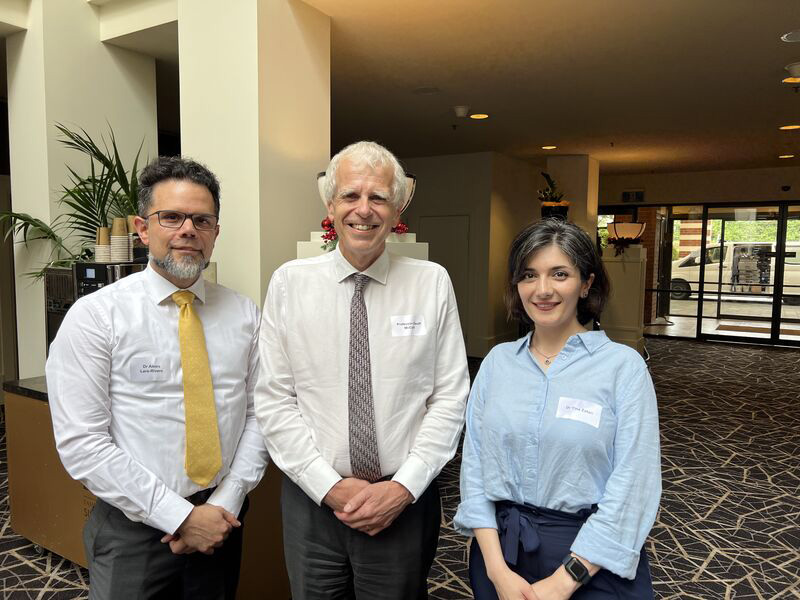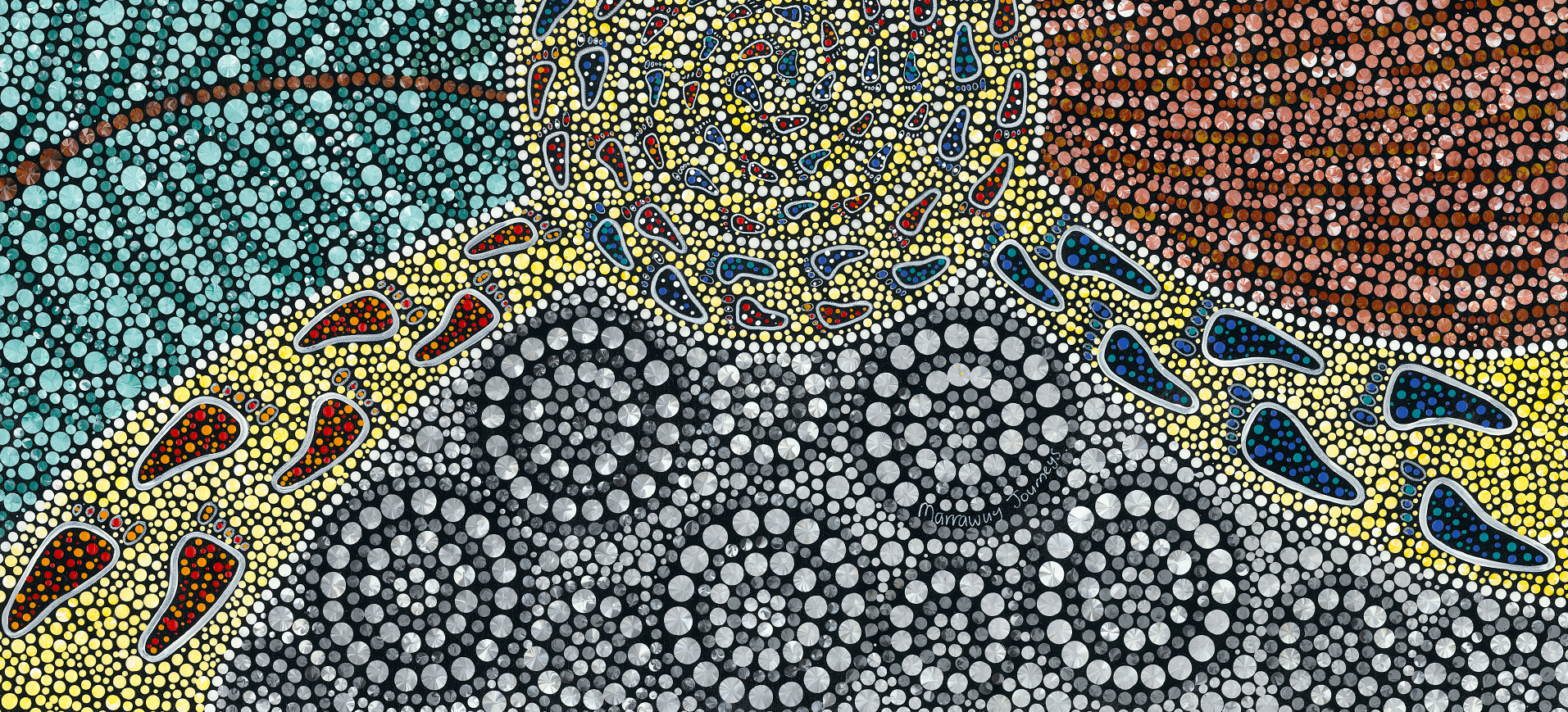
From left: AMC Council Member Dr Alexis Lara, AMC President Professor Geoff McColl and AMC Council Member Dr Tina Zafari at the AMC AGM held at the Hyatt Hotel, 29 November 2024.
The AMC recently created and appointed two new international medical graduate positions on the AMC Council as part of our ongoing commitment to bring the voices and perspectives of international medical graduates to policy and strategic direction.
Dr Tina Zafari
My name is Tina. I’m an overseas MD-MPH graduate as well as a PhD graduate from the University of Melbourne. I was born and raised in Iran and have been in Australia for seven years now.
At the moment, I am a GP Registrar in regional Victoria. During the past 4 years I’ve worked in various metropolitan and rural hospitals both in public and private sectors and mainly in surgical and emergency medicine roles.
I am also a board member of a few community organisations and host a podcast that aims to improve health literacy in the Farsi speaking community in Australia.
I wanted to join the AMC Council because I am passionate about contributing to the development of high-quality, inclusive healthcare standards in Australia. I hope to bring a unique blend of research and clinical experience, as well as cultural insight to this role.
As a practicing clinician-scientist, I understand the day-to-day realities of patient care as well as the bigger picture on a national and international scale. As an international medical graduate, I understand the challenges faced by international medical graduates in adapting to the Australian healthcare system, and I see this role as an opportunity to advocate for them while ensuring the highest standards of patient care.
My experience as a clinician, researcher, and community advocate has shown me how crucial culturally–competent and patient–centered care is. I am particularly passionate about ensuring that healthcare standards reflect the needs of Australia’s diverse population and that we support a workforce equipped to deliver equitable, patient-centered care.
***
My journey to practicing medicine in Australia has been both challenging and rewarding. Navigating the system required resilience, adaptability, and a commitment to continuous learning. One of the biggest challenges was understanding the nuances of the Australian healthcare system and adapting to its specific clinical and cultural expectations.
What truly helped me was a combination of mentorship, community support, and a proactive approach to integrating into the system. Having supportive colleagues and mentors who provided guidance and encouragement made a significant difference. Engaging with professional networks gave me a sense of belonging and access to resources tailored to international medical graduates.
Additionally, leveraging opportunities for professional development, such as working in varied clinical settings and pursuing further training, helped me build confidence and competence. I’m grateful for these experiences, and they fuel my passion to contribute to initiatives that make this journey smoother for others.
***
International medical graduates are a cornerstone of Australia’s healthcare system, contributing not only their medical expertise but also cultural sensitivity, innovation, and dedication to underserved areas. With over 50% of Australians born overseas or with at least one overseas-born parent, international medical graduates play a vital role in delivering culturally sensitive care that meets the diverse needs of the population. Their multilingual abilities enhance communication and trust with patients from culturally and linguistically diverse backgrounds, ensuring equitable access to healthcare.
International medical graduates also address critical workforce shortages, particularly in rural and remote areas, where around 41 per cent of doctors are international medical graduates. They bring fresh perspectives and innovative medical practices, enriching the healthcare system and fostering adaptability. Beyond patient care, international medical graduates contribute to training, research, and global collaboration, strengthening the profession and the broader economy.
With an ageing population and increasing demand for chronic disease management, the expertise and dedication of international medical graduates are more vital than ever. It’s essential to recognise and support their integration, as their work not only strengthens the healthcare system but also reflects Australia’s values of inclusivity and equity.
It’s crucial that the healthcare system recognises that international medical graduates are not just filling gaps — they are enriching the workforce with their skills and perspectives. Supporting their integration and development is not only a matter of equity but an investment in the strength and diversity of our healthcare system.
Dr Alexis Lara Rivero
My name is Alexis Lara Rivero. I’m a dermatologist and a physician trained in Venezuela, and I’ve been living here in Australia for 12 years working in the public and private sector as a dermatologist.
I took both the standard and the specialist pathway. I had to learn a lot. It was both challenging and rewarding at the same time, in terms of having a better understanding of the profile of the Australian patient, and the cultural awareness that we need to understand First Nations culture and choices in terms of health to be a safe, capable doctor here in Australia.
It’s a matter of having a better understanding and acceptance of all those differences. Precisely because at the end of the day, what we are trying to do as doctors is to provide a better outcome for our patients so that they can achieve good health overall.
Australia has become a multicultural society from both a patient’s perspective and also from the practitioner’s perspective. And it has created an interesting melting pot so to speak where we need to have an awareness about the intrinsic details that each patient or doctor actually encounters, from both their cultural perspective, but also from the social and health perspective as well.
***
The pathway was not easy. I might say the main challenge was to have a proper understanding of the requirements and the information provided. I am however happy that I can definitely see substantial changes since I went through the process, which is very reassuring and beneficial for the candidates that now apply. But, I think that there is always room for improvement, and as a newly appointed member of the AMC Council, I will try to support any changes that could make these pathways easier but also efficient.
I recommend to other international medical graduates who are trying to go through this process to do a lot of research in terms of preparing yourself for this. Getting advice from other international medical graduates who have actually completed these pathways is also very useful in terms of advice and guidance you may need. Please do not forget to be humble and to accept the differences that you might encounter.
It is very rewarding to complete it and to be allowed to work as a doctor here, as I feel we are really blessed to live in a country such as this.
To all of you who are undertaking this process: if I did it, believe me, you can do it.
